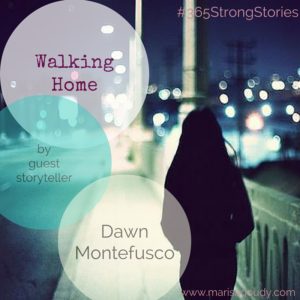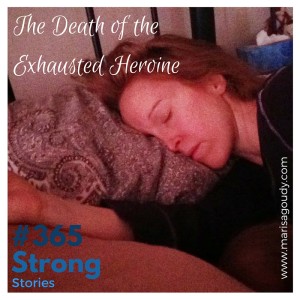
BLOG
Walking Home by Guest Storyteller Dawn Montefusco
Today's #365StrongStories guest story is special: it's a poem. Our storyteller Dawn Montefusco is a writing coach, so she definitely knows the rules of story well enough to break them. As she describes it, the piece is the complete hero's journey.
And this is a special time to be sharing "Walking Home." Dawn's free telesummit Write Because It Matters is airing now. She has collected 21 experts (including me!) to talk about how to get your own meaningful stories into the world. What a perfect time for this project to hold space for Dawn's story of strength, love, and evolution.
 I believe I am strong.
I believe I am strong.
I believe I am weak.
I believe I am separate.
I believe I am connected.
I believe I had a rough childhood.
I believe I am a blessed woman.
I believe that if I love people they will love me back.
I believe no one really loves me, they just say they do.
I believe I am great at what I do.
I believe I am imperfect and therefore messed up.
I believe I want peace.
I believe I hurt others.
I believe there is a reason for everything.
I don’t believe a thing.
I believe my heart will break if he leaves.
I believe we should part and it’s the best thing for both of us.
I believe nothing is working out.
I believe everything will be okay.
 Dawn Montefusco is a writer, speaker, poet and coach who escaped the Bronx in the 80's and now lives in Portland, Oregon.
Dawn Montefusco is a writer, speaker, poet and coach who escaped the Bronx in the 80's and now lives in Portland, Oregon.
Please join Dawn, me, and 20 other experts in the field of writing and publishing for the free Write Because It Matters summit that is running now.
The Exhausted Heroine's Inevitable Death, #365StrongStories 24
 There comes a day when the heroine is no longer exhausted. After an arduous journey, she simply vanishes.
In her place, you get a crabby lump of protagonist. Creativity, passion, and proactivity have all given way to listless desperation. The new character is simply named “Exhaustion” because no one has the energy to argue or come up with something better.
There comes a day when the heroine is no longer exhausted. After an arduous journey, she simply vanishes.
In her place, you get a crabby lump of protagonist. Creativity, passion, and proactivity have all given way to listless desperation. The new character is simply named “Exhaustion” because no one has the energy to argue or come up with something better.
It’s nearly impossible to write a story about Miss Exhaustion. She’s drained of dreams because everything is so dreamlike. She doesn’t think she has the resources to make a single useful change. She prone to conflict, but it’s all petty and dull stuff that everyone has heard too many times before.
And yet, Exhaustion loves story.
She binges on Mad Men instead of listening to thought-provoking podcasts. She lets the kids watch a movie. And then all the cruddy straight to video releases in the series too. She rereads paperbacks that comforted her in high school and every chapter is a surprise because her memory is shot by this chronic, crushing fatigue.
Exhaustion find it impossible to write a story. Her own story isn’t worth a second glance. But at least she has gratitude for all the authors and showrunners and exuberant children who fill the days and nights with narratives that give her hope to awaken to another day.
A Modern Entrepreneurial Hero's Journey, #365StrongStories 14
 Last fall, I wrote my way to the edges of my own mastery when I realized I couldn’t confidently complete the sentence “a good story is…”
Last fall, I wrote my way to the edges of my own mastery when I realized I couldn’t confidently complete the sentence “a good story is…”
As a lover of both fiction and creative non-fiction, this was disconcerting. For a writing coach, this was terrifying.
For months, I turned inward.
I was writing more than ever, but I wasn’t producing many full sentences. There were lists and notes and lots of arrows slicing across the page.
This was the stuff of discovery, not publication. And yet, something magical was happening.
The hero's quest is realized when she brings home the healing elixir to serve the greater good. And so, it was my mission to understand and then teach what makes a strong story.
First, I had to understand why I cared so much. Only then would I know how to help anyone else understand why stories and storytelling matter.
Stories are how we understand the world.
Stories are how we transmit ideas.
Stories are the building blocks of consciousness.
In compelling stories of growth and transformation, the hero may be may start the story as an innocent, but she is not without skills. (Rey flew the Millennium Falcon, didn’t she?) Instead, the journey is an awakening of latent powers and wisdom.
That’s what this journey into “what makes a strong story?” was for me - a chance to realize that I’d been a storyteller all along.
Ultimately, what I gained, in addition to confidence, was the ability to be a guide. And so, as I did what all modern entrepreneurial heroes do: I created an ebook.
(Do I see the irony that my heroes are Jedis and my great quest involves a subscription to LeadPages. Yes, but that’s a whole other story).
I wrote this guide for you, dear reader, and I would like you to read it. I want you to read it because I know you're a storyteller too (even if you haven't discovered your powers yet) and because I want you to tell your own Strong Stories too.
Why Myth Matters to Your Writing and Marketing
We need myth. We always have, and we always will - if we want to retain our humanity.
Called “a roadmap to the human psyche,” myths exist to explain the big questions like “for what reason was I born?” and “what will happen to me when I die?”
Myths lay out pretty clearly what is on the human smorgasbord: what we want, what we fear, what we would like to have, what we would very much not like to have. Those human fears and human desires really have not changed, and they're reflected in the myths that have been with us for a long time.
--Margaret Atwood
Myths are also indispensable when it comes to less existential matters like creating a Hollywood blockbuster, writing a novel, and assembling a marketing plan.
The Myth that Everyone Knows: The Hero’s Journey
The Hero’s Journey as originally framed by Joseph Campbell is something of a cultural standard these days, particularly for storytellers.
Turns out, “everyone” wasn’t always aware of this great twelve part cycle until Christopher Vogler brought it to Hollywood’s attention in the mid-1980s (at least that’s how he tells it). Of course, it was hiding in plain sight as George Lucas’s Star Wars had already transported us to a galaxy far, far away and transformed movie hero-dom forever. (Later, John Wayne, we've got a farm boy with a character arc!)
Vogler offers great advice on following the Hero framework when crafting a story (this also applies to any attempt to lay your ideas over someone else’s framework):
As with any formula, there are pitfalls to be avoided... The hero myth is a skeleton that should be masked with the details of the individual story, and the structure should not call attention to itself. The order of the hero’s stages as given here is only one of many variations – the stages can be deleted, added to, and drastically re-shuffled without losing any of their power.
The myth is infinitely flexible, capable of endless variation without sacrificing any of its magic, and it will outlive us all.
(While you’re brushing up on the basics of the Hero’s Journey, do check out the summary of the Heroine’s Journey by Maureen Murdock too… I know I’m intrigued.)
The Hero’s Journey through the Marketplace
The hero's story is is a human story that speaks to us on multiple levels. At its best, the Hero’s Journey can connect people with resources that will better their lives. At its most banal, it can be used to make people buy stuff.
First, the “what NOT to do” example.
In Brand Storytelling: 10 Steps to Start Your Content Marketing Hero’s Journey, you’re guided through “The CM Brand Hero’s Journey."
Stop. Right. There.
Develop a marketing and content strategy with you or your brand in the hero’s role and you’ll alienate those who really matter to the story: the people who invest in your work and use it to change their own lives.
The brand is not the hero, just as the writer is not the hero. In case you forgot, Pamela Slim will remind you: It is not about you.
Lest we get sidetracked, deriding those evil marketers who cheapen and co-opt everything, there are clever, useful, sensitive ways to apply this wisdom to business.
Copyblogger’s Brian Clark masterfully re-envisions the role of the brand in the hero's tale: the magical mentor.
The mistake most often made in “marketing” is thinking of your business as the hero, which results in egocentric messages that no one else cares about.
The prospect is always the primary hero, because they are the one going on the journey — whether big or small — to solve a problem or satisfy a desire.
Another reason to tune in to this New Rainmaker podcast: Echoing the cyclical nature of the hero’s journey, you get a new perspective on the funnel: the concentric circles of belief. (If you're excited by the Heroine's Journey this "feminine" diagram of the sales process may really appeal to you.)
A New Mythic Model for the Magical Mentor
Brian Clark employs two of our most beloved mentors to illustrate his point: Obi Wan and Morpheus from The Matrix. You know these guys. You'd trust them if you were chosen to save the world.
Here’s another option that hasn't hit the multiplex: the Sovereignty Goddess.
As I describe in my St. Patrick’s Day post, 5 Lessons on Writing and Entrepreneurship from an Irish Goddess, the Celtic Sovereignty Goddess plays a vital - though fleeting - role in the creation of the hero. She owns her magic and never stresses about playing second fiddle.
“Just” having a supporting role in the hero’s journey is actually what being a storyteller or running a business is all about.
This introduces the paradox of the hero:
We don’t need another hero. Everyone is a hero.
You’re most effective when you realize you’re not the hero of the piece you’re writing or the business you’re running. And yet, you must remember you're the hero of your own story.
The Hero’s Quest: Be of Service
“The hero’s journey is to be of service”: that’s Lisa Engel’s “ah ha” statement at the end of this episode of The Jess, Scott, and You show, “In the Service of Others.” (I had the good fortune to be a guest on this particular show too.)
Though it’s true that it’s not all about you (here, Susie Moore explains why that is such a good thing), you are also on your own quest. You must practice self-care and act from self-love and self-interest in order to grow and meet your potential (we discussed that at length on the show).
You'll never prove your heroism through an egotistical romp aimed showing off your skills and authority. Instead, you become the hero through a willingness to imagine, learn, endure, transform, and then bring the magical elixir home.
Who are your heroes? How have you been called to take on the role of the hero? And what has that taught you about who is really in charge? Leave a comment or tag me with the answer on your favorite social media platform.

